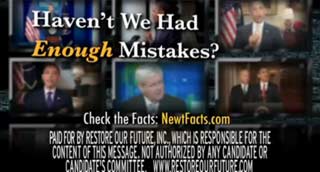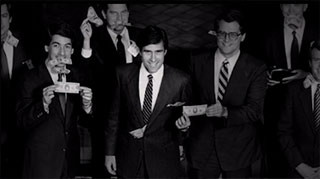The 2010 Supreme Court Citizens United decision has meant that money itself — not policy — not likeability — not experience — not insider status — not outsider status — is having a profound impact on who can stay in the presidential race. Come next December, TIME magazine’s person of the year might just be — not the protester — but the super political action committee, or super PAC. The cover will show a group of masked, anonymous donors who invested in the race for president, and won.
Citizens United and the DC Court decision called SpeechNow led to the creation of the super PAC, a legal entity that “may raise unlimited sums of money from corporations, unions, associations and individuals, then spend unlimited sums to overtly advocate for or against political candidates” according to the Center for Responsive Politics.
So, how is it working? Super PACS are functioning as outsourced loyal attack dogs for candidates who must not directly coordinate on ads with the super PACS. The donors are accountable to the Federal Election Commission but the donors’ identities can be shielded behind a corporate veil or a hard-to-track nonprofit, and may never come out — certainly not before the primary has determined the winner. It would be the perfect crime if it weren’t already legal. It is legal, thanks to Citizens United.
The rule that “super PACs are prohibited from donating money directly to political candidates” is changing the tone from implied accountability — candidates who must state “I approve this message” — to one of passive dismissal in which candidates distance themselves from attack ads saying, “I had nothing to do with it.” A New York Times editorial on Jan. 3, 2012 (in the shadow of the Iowa caucuses) forecast what was in store: “As bad as the 2010 midterm elections were for the influence of big money, this year’s presidential campaign — the first since the Supreme Court’s Citizens United decision two years ago — is shaping up to be worse. There are no limits to the dollars involved, and no accountability for the candidates those dollars are buying.”
More recently the AP had data to back up what The Times and others criticized with “the first tangible signs of how new super political action committees, which can spend unlimited amounts of cash to influence elections, are poised to remake presidential politics this year.”
You won’t hear this year’s Republican contenders complain straight out, as they are dependent on the hand that feeds them to stay in the race.
A few examples of how this is playing out.

A scene from an ad produced by Restore Our Future
In Iowa, a Super PAC called “Restore Our Future” ran a barrage of negative ads attacking Newt Gingrich, the reported frontrunner following the debates. Mitt Romney had committed some blunders including the faux pas of offering a $10,000 bet to Rick Perry in a state where that is a lot of money, causing him to lose popularity. Enter “Restore Our Future,” a Romney-allied super PAC that was able to buy ads and change the public conversation from one that questioned Romney to an all-out assault on Newt Gingrich’s character. It worked. Newt was deflated. As the AP reported last week, super PAC money seems to be “money well spent.”
Next up, for the New Hampshire primary, Newt was not to be set back by another assault by “unknown enemies.” A super PAC, not so subtly called “Winning Our Future” released an anti-Romney short film entitled “King of Bain: When Mitt Romney Came to Town” on the Net. While bits and pieces of information about the film donors have come out — we know that one is billionaire casino owner (and Gingrich supporter) Sheldon Adelson — there could be more undisclosed donors. Meanwhile, Gingrich claims to have a vested interest in “truth” as his supporters’ super PAC continues to spread a mélange of disinformation. Money talks. It’s like hiring a hitman, but not being liable for the murder.
A New York Times Opinionator blog post captured the catch-22 that Gingrich found himself in vis-à-vis super PACs, recalling his support for Citizens United: “I actually think the Citizens United case is one of the best examples of a genuine strategy that I’ve seen in the years I’ve been in Washington…” and an earlier video plea he made: “Please join Citizens United and me in our fight for the First Amendment rights of every citizen.”
The love-hate codependency of the candidates on super PAC big money was clearly in evidence at the South Carolina debates. Rick Santorum criticized the pro-Romney “Restore our Future” super PAC ads while Romney played the innocent bystander, saying, “I did not have a super PAC run an ad against you. That’s — as you know, that’s something which is completely out of the control of candidates.”
Newt Gingrich, not to be left out of a good fight, added: “This is typical of what both Sen. Santorum and I have complained about with Gov. Romney’s super PAC, over which he apparently has no influence, which makes you wonder how much influence he’d have if he were president.”
Romney then said, “Anything that’s false in PAC ads should be taken off the air but I can’t call them and ask them; that would violate Federal Law.”
Romney added, referring to the Bain hit, “Your super PAC ad; however is the biggest hoax since Big Foot! We’d all like Super PACS to disappear. I’d like to get rid of McCain Feingold and all campaign finance so we can spend as we wish.”
What a mudfight!
Even as Gingrich cringed and shook his finger in disgust at the ads attacking him, he did not revoke his Citizens United endorsement. Romney blamed campaign finance reform and asked for even fewer restrictions on the flow of money into campaigns. No surprise, really. If he could get rid of all regulation he could just buy the election more directly. Read his tax returns. He has the means.
For now, the candidates remain dependent on super PAC money. And sure enough the day after criticizing super PACS for his loss in South Carolina, Romney was out stumping for them, telling reporters at The Los Angeles Times, “It’s not that I don’t support super PACs … We raise money for super PACs. We encourage super PACs. Each candidate has done that.”
“Like the others,” he said, “I also encouraged the creation of a super PAC, and following the guidelines laid out by the Supreme Court, encouraged people to make contributions to the super PAC.” He added: “I just don’t like the way the law is, but we certainly follow the law.”
Ah, the letter of the law. And so it is that the law has left plenty of room for secret money to leave voters in the dark about who is funding the candidates and to what tune, and whether the donors have too much influence in who will ultimately be the president of the United States. This so-called “dark money” puts the outcome of our democratic process at risk.
Keep an eye on Super PAC spending and splurging with help from our Money and Politics watchdog list.


